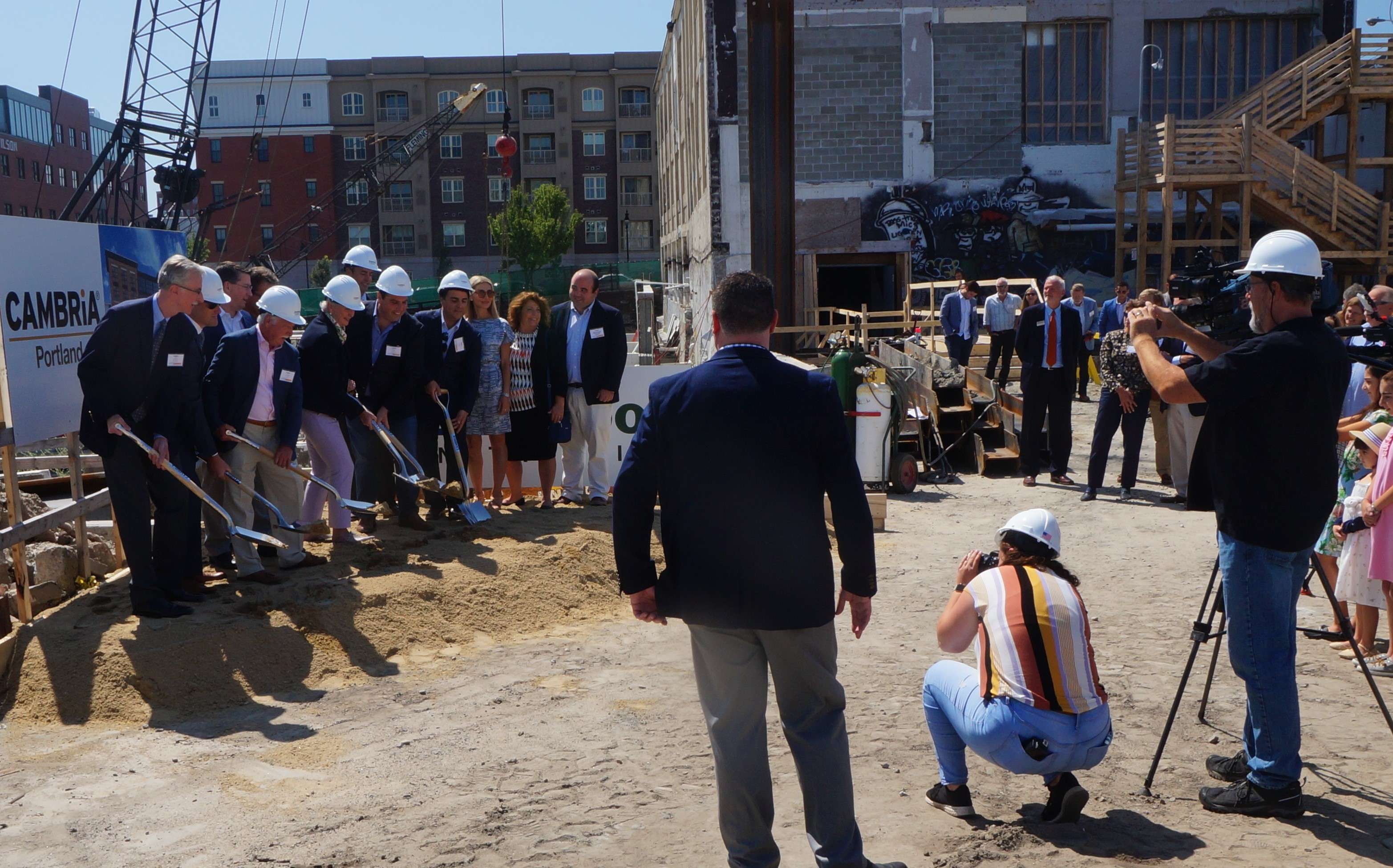
Processing Your Payment
Please do not leave this page until complete. This can take a few moments.
- News
-
Editions
View Digital Editions
Biweekly Issues
- December 1, 2025
- Nov. 17, 2025
- November 03, 2025
- October 20, 2025
- October 6, 2025
- September 22, 2025
- + More
Special Editions
- Lists
- Viewpoints
-
Our Events
Event Info
Award Honorees
- Calendar
- Biz Marketplace
Portland peninsula hotel boom still has room to grow, panel says
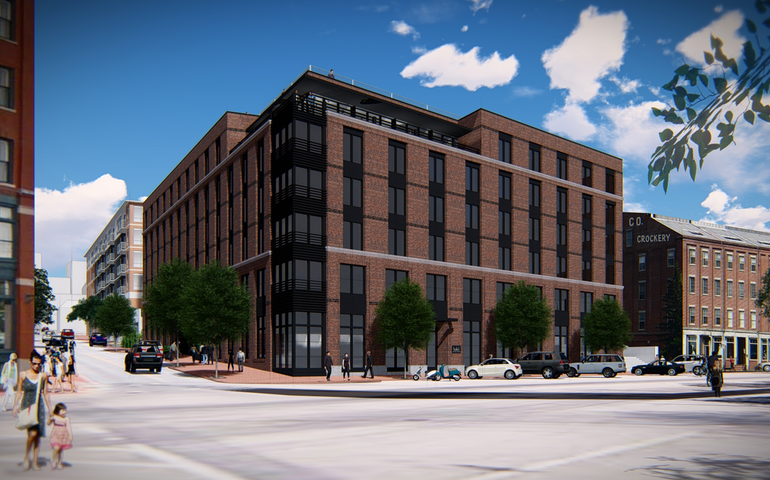 Courtesy / Fathom Cos.
An updated rendering of the planned Canopy by Hilton hotel in downtown Portland.
Courtesy / Fathom Cos.
An updated rendering of the planned Canopy by Hilton hotel in downtown Portland.
Two new hotels are under construction, one is close to starting and more are planned for Portland's peninsula, but the saturation point hasn't been reached yet, a room packed with real estate brokers, developers and hospitality industry representatives was told Tuesday morning.
But as the number of hotels in the small commercial core of the city continues to increase, and challenges related to rising costs and labor shortages also continue, developers have to think hard about the product, said Matt Arrants, executive vice president of Pinnacle Advisory Group, speaking to a breakfast hosting by the Maine Real Estate and Development Association.
Arrants, along with developer Jim Brady, president and director of Fathom Cos., and moderator David Soley, of Bernstein Shur, spoke about hotel development opportunities and forecasts as part of MEREDA's breakfast series.
Soley said that Portland's elevation as a destination is helping to raise the ceiling.
"Where in the past, Portland was a tertiary American city, it's now becoming a secondary American city," he said. Portland "is one of the strongest secondary markets in the country," and attracting a lot of attention nationally.
Brady said that besides the tourist and vacation business at the peninsula's hotels, corporate use plays a role, driven by the offices of companies like WEX Inc., Stone Coast Fund Services and Covetrus.
"They're organically growing and coming to the peninsula," he said.
Both Brady and Arrants said that despite challenges posed by a tough labor market and tariffs, the peninsula's hotel activity will continue to boom in the near future.

'Dramatic and steady'
When several hotels opened in 2012-13 on the peninsula, increasing capacity by 63%, occupancy dropped from 76% in 2013 to 67% in 2014, Arrants said. He said a slump happens as people get used to a new product in a market. But then occupancy began "a dramatic and steady climb" to the 77% it is now.
The average daily rate went down slightly during the brief slump, from $195 a room in 2012 to closer to $190, but in 2015 it, too, began to climb to the $215 it is today.
He said, too, that the boom on the peninsula hasn't had much of an impact in the Portland area overall, where occupancy is at 62.8%, a drop of 1.1% from 2018. The average daily room rate is $132.77, a 1.1% increase from 2018. Revenue per available room is $83.32, a figure that's remained steady since last year.
Capacity rate eventually hits a ceiling, he said. To grow it higher, "You have to start killing on Sunday in February and March," an unlikely prospect for Maine.
Three hotels are due to open in 2021 — the 157-room Aloft, on Commercial Street; the 102-room Cambria Portland Hotel at 25 Hancock St.; and Brady's 135-room Canopy by Hilton, at the corner of Center and Commercial streets.
Arrants said the three hotels will increase capacity on the peninsula by 23%. "It's not the 63% in 2014, but it could have an impact," he said. Several more are planned, though haven't reached the development stage.
Branding, yet unique
Arrants said the importance of brand, and attention to where the demand is coming from are what will keep the market strong as new hotels are added.
Brady said it's important to create a unique product, even if tied to a brand.
His Press Hotel in the former Portland Press Herald building on Congress Street is an Autograph by Marriott. The Canopy is a Hilton brand. While franchising means conforming to the brand's requirements, the more "boutiquey" brands allow more flexibility, he said. Boutique hotels, whether independent or a franchise, are an increasingly popular trend, he said.
"Nowadays guests want something unique," Brady said. "They want something customized and local."
He said developers also are making designs flexible, so they can evolve as trends do. Both the Canopy and the Cambria Portland Hotel, for instance, have rooftop bars as well as indoor ones. Brady said plans are to start construction on the Canopy in October. Cambria Portland Hotel broke ground last month.
Labor costs, as well as furnishing a hotel — the kitchen fixtures and equipment alone in the planned Canopy are $850,000 — are huge costs.
Labor and construction costs have risen two times faster than inflation, he said.
About 700 square feet per room is needed to built a hotel to accommodate the areas that most guests don't see — kitchen, offices, and more account for a large portion of the building. Developers are looking at "how to create a really efficient hotel room." That includes, just as with newer residential development, a trend toward smaller rooms and larger public areas.
Statewide trends
Nationally, Arrants said that statewide, average daily room rates and revenue per available room is rising slightly, though occupancy was down slightly from 2018 to 2019, which is also a national trend.
Occupancy across Maine so far in 2019 is 56.7%, down 1.5% from 2018. The average daily rate is $134.76, up from $130.42 in 2018. Revenue per available room is $76.44 this year, up from $75.07 last year.
Notable projects outside the Portland area cited by Arrant include the Cliff House renovation in Cape Neddick and the sale of the Spruce Point Inn in Boothbay Harbor, both funded by out-of-state investors, and the proposed Lockwood Hotel in Waterville, being developed by Colby College.
He said the big question now is what's going to happen with the economy. "The good times only go on so long," he said. "When your dentist is talking to you about investing in a hotel, you know you're probably at the top of the cycle."
Arrants said the "cautiously" optimistic tone has shifting to caution — but without panic.
He said glass-half-full people will forge ahead, while, for glass-half-empty types "it could get ugly."
Mainebiz web partners

The Giving Guide
The Giving Guide helps nonprofits have the opportunity to showcase and differentiate their organizations so that businesses better understand how they can contribute to a nonprofit’s mission and work.
Learn More
Work for ME
Work for ME is a workforce development tool to help Maine’s employers target Maine’s emerging workforce. Work for ME highlights each industry, its impact on Maine’s economy, the jobs available to entry-level workers, the training and education needed to get a career started.
Learn More
Groundbreaking Maine
Whether you’re a developer, financer, architect, or industry enthusiast, Groundbreaking Maine is crafted to be your go-to source for valuable insights in Maine’s real estate and construction community.
Learn more-
The Giving Guide
The Giving Guide helps nonprofits have the opportunity to showcase and differentiate their organizations so that businesses better understand how they can contribute to a nonprofit’s mission and work.
-
Work for ME
Work for ME is a workforce development tool to help Maine’s employers target Maine’s emerging workforce. Work for ME highlights each industry, its impact on Maine’s economy, the jobs available to entry-level workers, the training and education needed to get a career started.
-
Groundbreaking Maine
Whether you’re a developer, financer, architect, or industry enthusiast, Groundbreaking Maine is crafted to be your go-to source for valuable insights in Maine’s real estate and construction community.
ABOUT
NEW ENGLAND BUSINESS MEDIA SITES
No articles left
Get access now
In order to use this feature, we need some information from you. You can also login or register for a free account.
By clicking submit you are agreeing to our cookie usage and Privacy Policy
Already have an account? Login
Already have an account? Login
Want to create an account? Register
Get access now
In order to use this feature, we need some information from you. You can also login or register for a free account.
By clicking submit you are agreeing to our cookie usage and Privacy Policy
Already have an account? Login
Already have an account? Login
Want to create an account? Register







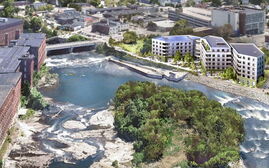
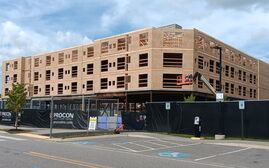
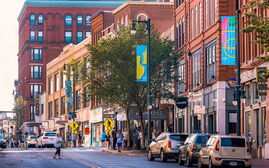

0 Comments